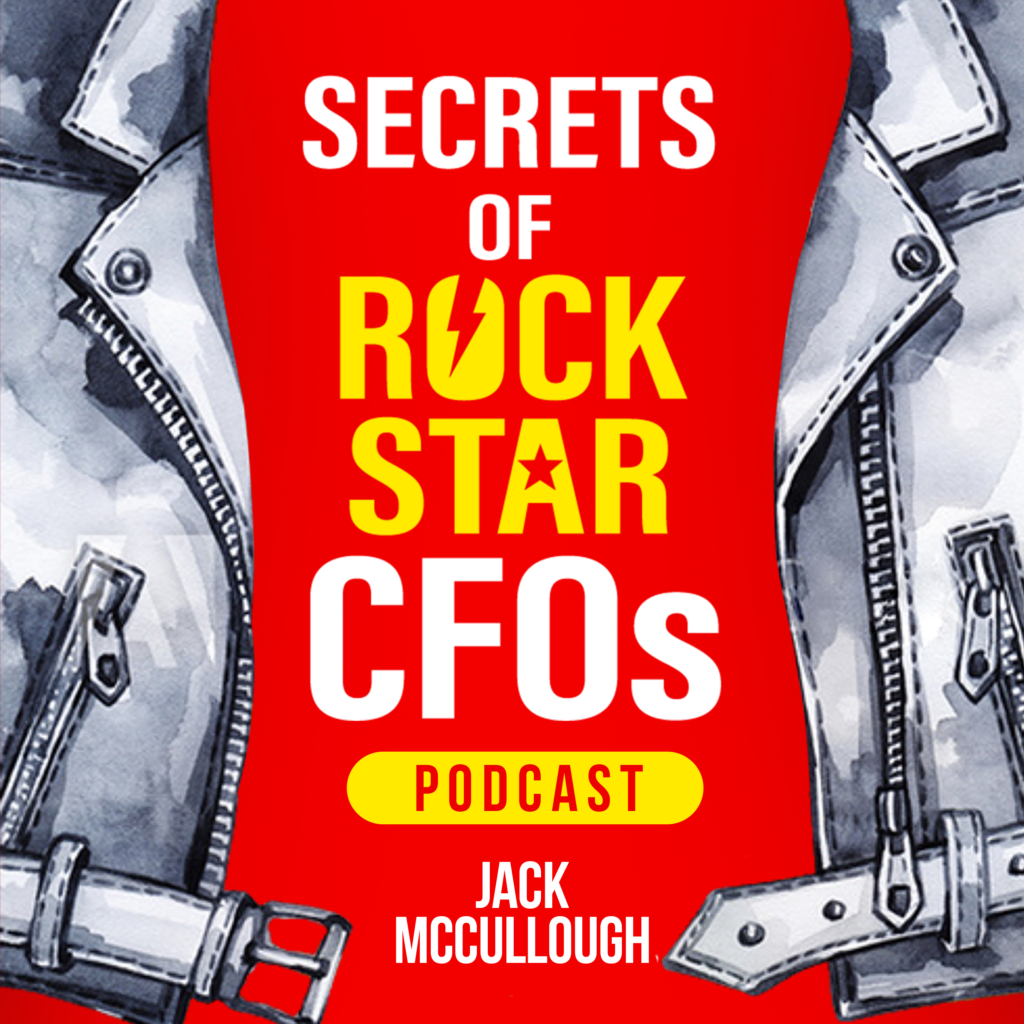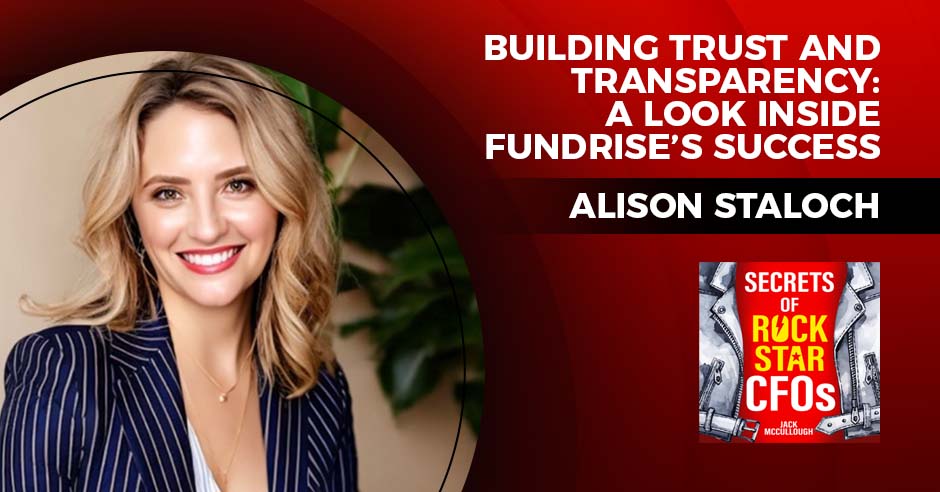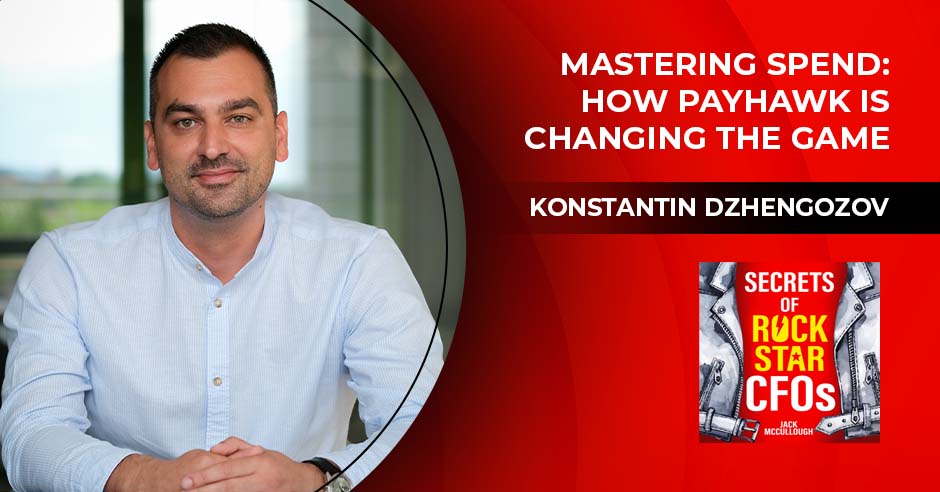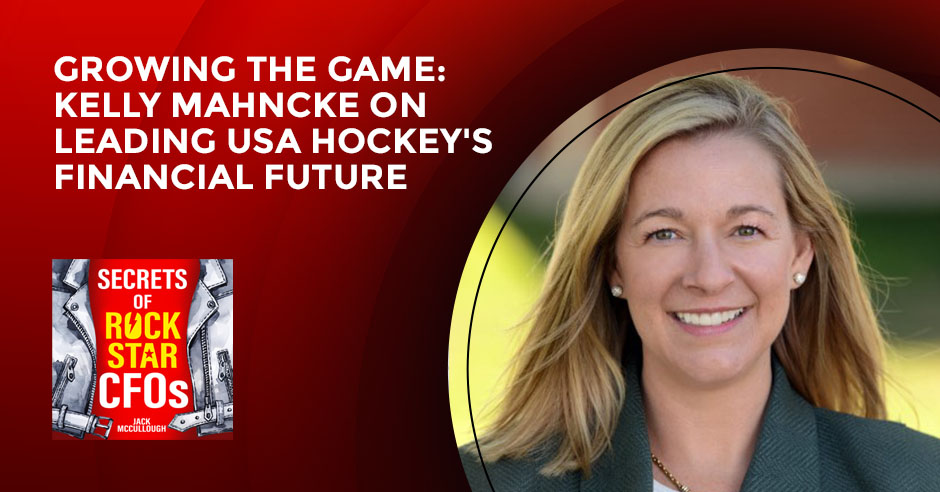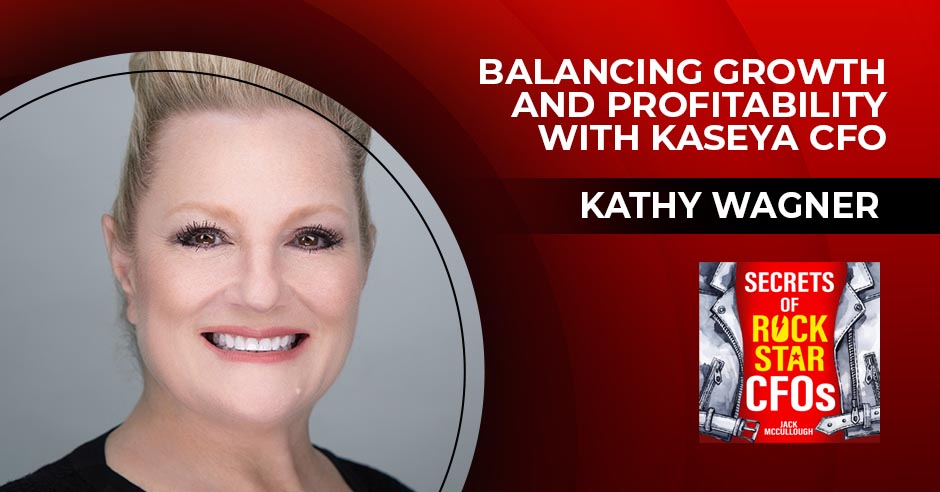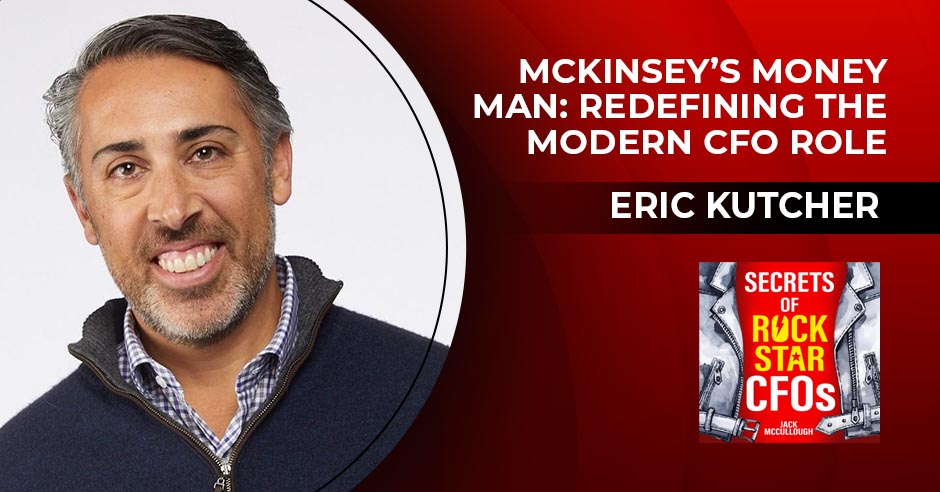Sean Brecker made a major career shift when he left investment banking to join meditation startup Headspace. That somewhat serendipitous transition eventually led to his current role with healthcare and wellness company ŌURA. Known for their ring that tracks everything from sleep to heart health and illness detection, Oura has been making waves, now valued at $2.5 billion. Brecker serves at the crux of it all, seeing his role as the advisor to senior leadership, guided by the numbers.
He sat down with Jack McCullough to talk about his career journey, how Oura is staying on the cutting edge and the importance of a “beginner’s mindset.” Listen by clicking below. The Q&A, lightly edited and trimmed for clarity, follows.
—
Listen to the podcast here
We have a great CFO with one of the coolest companies I’ve come across. Let’s rock. Our guest is Sean Brecker. Sean is the CFO of Oura. Sean, welcome to the show.
Thanks so much, Jack. It’s great to be here.
It’s great to have you. When your team reached out about doing this, I was really excited because wearing one of your rings is a real badge of honor. I know they’re huge in Silicon Valley. It’s like you walk around there and you feel like an outcast if you’re not wearing one, which is quite a thing. For those who are perhaps unfamiliar, do you want to give the 10,000-foot view of your company?
I work for a company called Oura. It’s actually a Finnish company, although most of our C-Suite is in the United States, specifically in the Bay Area, with one outlier based in Los Angeles, but I spent a lot of time in the Bay Area. We make a product that is called the Oura Ring. It’s a smart ring. It’s a wearable device that has a number of sensors, and just as importantly, a number of proprietary software algorithms that can measure all kinds of insights about your health. Where we got started was really around sleep. Since then we’ve made significant strides around heart health, women’s health, fitness, movement, etc. It’s a ring that is a form of wearable but delivers a tremendous amount of insights via an app on the smartphone.
The technology is amazing. It’s not going to be too long before people are going to be living to 150 years old because of the high-tech type of innovation. We’ll get into some of the challenges and exciting things going on there. I wanted to first talk a little bit about you. One thing that jumped out at me, you’re the first guest I’ve had so far who was born in the United States and went to high school in England—London, I believe. Curious what that was like.
I was actually born in Pakistan. Then I moved to London at the age of two. I am an American citizen. I only hold one passport, which is the American passport. I spent my childhood really from two until 18 in the UK. In the early parts of my childhood, I went to English schools, and so I sounded fully English. Then for a number of reasons in the seventh grade, my parents decided to move me to a school that is called The American School in London. It’s not particularly imaginatively named but it is as if you picked up an American K-12 school and you dropped it in the heart of London.
At that time it was mostly American kids, although today, it is much of an international school, mostly an American faculty teaching an American curriculum. Most of the kids went on to go to college in the United States. It was an incredible experience being at what we call ASL. My English accents are slowly starting to get chipped away and I became pretty Americanized in those formative years in the seventh to ninth grade. I spent my whole childhood in London.
You had me fooled, I thought for sure you were a lifetime American. Can you still do the English accent?
I think if you put a cocktail or two in me, it might come back. Sometimes, I still consider London home. Most of my family is still there. Sometimes when I’m back, if I’m in a taxi and I’m talking to the cabbie, the twang might come back a little bit. That place is really home for me.
I know a guy who thinks Americans are nicer to English people than they are to other Americans. He’s a Brit, and he’s beginning to lose the accent but he’s fighting to keep it because he thinks it’s more effective in sales. My Uncle Pat moved from Ireland to the United States in 1929. He died in 1992, and he had the thickest accent you’ve ever heard. He never lost a trace of his accent. He used to say, “Give me a chance. I’ve only been here 60 years.” Anyway, you went to school in London. What attracted you to a career in finance and business in general?
The families at the American School were mostly expat families. The families there, the parents typically worked in a lot of investment banks or large multinational banks, some oil companies, some in politics. For instance, the ambassador’s kid went to our school. I was surrounded by a lot of friends whose parents were in banking. I started to have exposure to finance and specifically the capital markets at a pretty young age. I found it pretty fascinating. I always gravitated towards math. Math was always my favorite subject. I had the most sensational math teacher at the American School who I was just reunited with a couple of years ago.
I went back to actually give the commencement address at my high school summers ago, and I got reunited with Suzanne Brooks. Shout out to Miss Brooks, my math teacher back then. Math obviously plays a pretty pivotal role in the world of finance. I just naturally had a draw towards finance. My parents were not in finance at all. They were in the apparel manufacturing business, far from the world of global finance. I just found it really fascinating and starting to become a student of the markets and understand how the markets work. I just thought it was really exciting. I very naturally had a pull towards that world.
You, in fact, started your career in investment banking, right?
That’s right. I studied math. In 1993, I moved to the United States to attend college. I graduated college in ‘97. In ‘97, I took a role in JPMorgan. This was before the Chase merger. This is the old JPMorgan in New York, 60 Wall Street, very exciting. I started my career literally on Wall Street for a very famous global bank. I really spent the majority of my time in investment banking on the market side and specifically working as a trader. I did that for a few years and then went back to business school.
Then after business school, I continued my career as a trader but this time trading derivatives, and specifically in the world of fixed income. I went to work for Lehman Brothers in London after graduating from business school in 2003. I did that for a few years. My boss then tapped me on the shoulder one day on the training floor and said, “You understand derivatives. We’re building a commodities franchise. We’ve hired a bunch of folks who know how to move physical commodities around the world, but we’re lacking some expertise in derivatives. Do you want to start up a derivatives franchise in commodities?” So, I did that. We recruited a gentleman out of Goldman Sachs. He was my partner, and the two of us basically co-founded this derivatives desk.
A year later, he tapped me on the shoulder again and said, “You guys have done an awesome job. Someone needs to go and replicate it in Asia. Why don’t you move to Singapore and go build it out in Singapore?” That’s what I did. I ended up spending seven years in Singapore. Of course, Lehman Brothers sadly went on to bankruptcy, but I stayed in Singapore working for other large investment banks like Citi Group, and did that until 2014.
You’ve had a hell of a run at a relatively young point in your career. You went to Wesleyan and you studied mathematics and economics.
That’s correct.
As a New England Patriots fan, that’s Bill Belichick’s background. Did you ever consider going into NFL coaching?
I didn’t, but you’re right, Bill Belichick is one of the most famous alums at Wesleyan, which is funny because Wesleyan is not known for being a big football school, a Division III NESCAC football powerhouse. I would love to have gone into football coaching, but sadly growing up in England, we didn’t have a ton of exposure. The football we were exposed to was the one with the round ball that you kick with your feet, not the pig skin that you throw.
I think that version is probably the real football. There’s very little kicking in American football. Interesting but cool. Great background, learned a lot some great stuff. I believe straight out of investment banking, your first job was Headspace.
Yes. That’s right.
You had a great run there for about a decade. Tell us a little about that.
Basically in 2014, when I left investment banking, my wife and I also left Singapore at that point. We had three young children. All three of our kids were born in Singapore. We wanted to be closer to our families in the U.S., and we decided to pick up and move to California. My plan was to take a year off and to try and figure out what to do next. There weren’t a ton of commodity trading opportunities in California. It felt to me like it was time to try something different but I wasn’t quite sure what that was going to be.
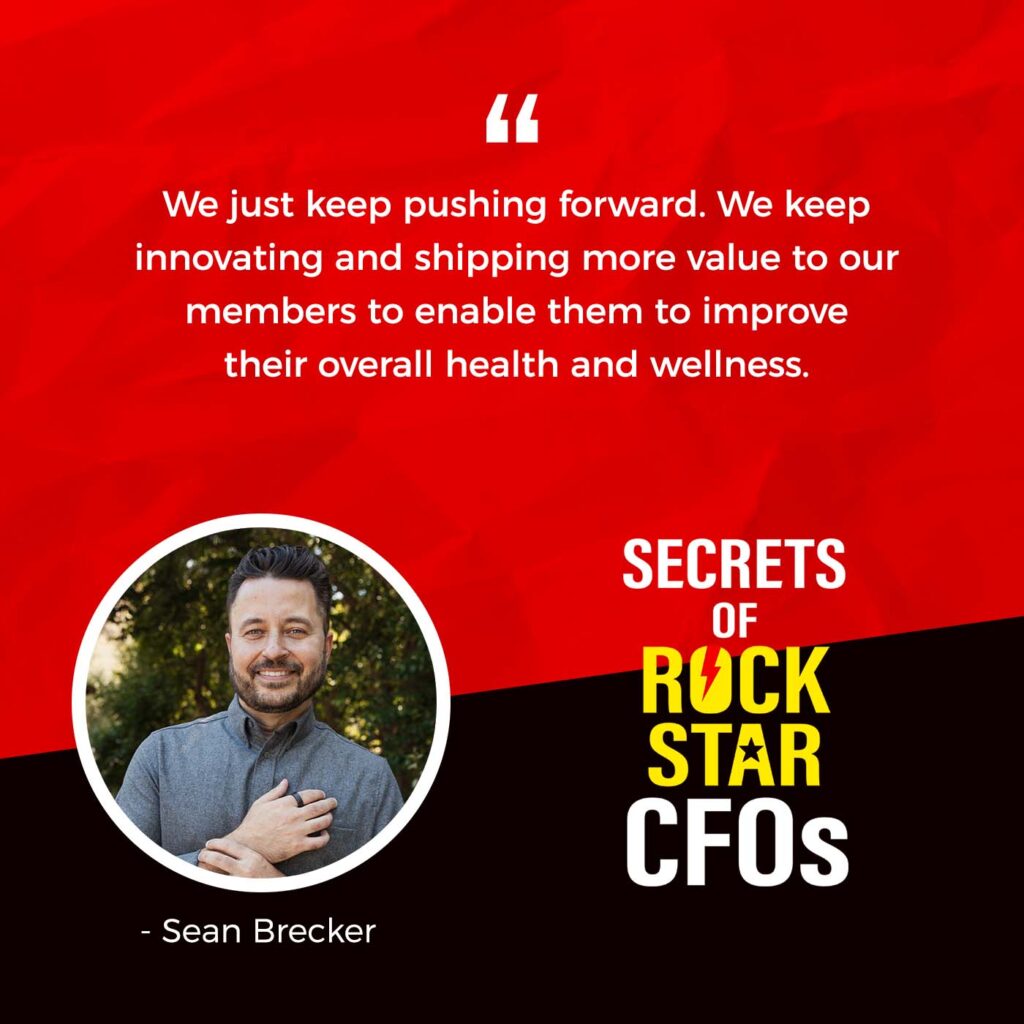
About a month into that year off, I ended up being recruited to Headspace by one of its founders. That gentleman, a fantastic guy named Rich Pierson, was an old friend of mine when I was living in London right out of business school. He and his co-founder, two Brits, had founded this company, Headspace, in London. They moved the company to the United States, and specifically to Los Angeles, in 2013. They were just getting going. They had launched effectively a meditation app. It was a subscription offering that would guide folks on how to meditate. It was pretty nascent. They hadn’t raised any capital. They had, at the time, maybe 20,000 subscribers, and they’d effectively just bootstrapped it.
Rich’s background was in advertising. His co-founder, Andy, was a former Tibetan Buddhist monk, so not your classic startup. Not your typical founding story. This is not two computer science grads from Stanford in their proverbial Silicon Valley garage. Nothing could be further from the case. We had lost touch when I was in Singapore. Rich reached out to me and said, “I saw that you’ve moved to LA. I’ve also moved to LA. I’d love to get together and reconnect and tell you a little bit about what I’m working on.” I had heard through the grapevine that they were doing something in meditation. When he explained the concept to me, honestly, I thought, “You’ve lost your mind. You had this amazing job in advertising that you’ve left to start up this niche meditation app. How big could that be? How many people meditate?” What’s so ironic is I think I had all the stereotypes around meditation that we at Headspace worked so hard to break down over the decade that I was there.
Long story short, Rich and Andy asked me to come on board and just help. At the time, it was very unstructured. I was the “numbers” guy. The running joke was I was the only person that had a license to Microsoft Excel. No one else knew how to use Excel. I was just a casual numbers guy. In pretty short order, we started to get more structured as we thought about raising capital. Rich and Andy would say, “Should we raise capital? How does that work, and so on and so forth?” I would say, “I’m a first-time operator. I don’t really know, but I’m willing to put one foot in front of the other and go figure it out.” That was basically what we did for the better part of a decade.
I did a number of different roles there. I was the CEO for a few years. I was CFO for many years. Even when wearing this CFO hat, besides traditional roles of finance, accounting, and corp dev, I also had things like HR and growth and science. When we launched a B2B business, I was in charge of that for a short period. Corporate IT, risk, I wore a number of different hats. I ended up spending 10 years there. We went on to raise about $350 million. We got the business to about $3 billion enterprise value. It was just an incredible privilege working there, and honestly just the journey of a lifetime.
It’s one of those things like you hear actors say they got a great role at such a young age, like the young guy from Breaking Bad, Jesse. He’s 26. He’ll never have a better role no matter how long he acts. You’re like that, right? The odds of replicating that is pretty slim. Sean, you mentioned you have three children. Do you like dad jokes? Because you made me think of one.
It’s funny you mention that because I was pretty famous at Headspace for having just the most cringy dad jokes. Jack, I’m all about dad jokes.
This one would have fit in well at Headspace. I needed a hobby, so I decided to take up meditation. It beats sitting around doing nothing.
That’s perfect.
That’s too bad you didn’t know it at the time.
I’m happy to add that to my repertoire.
Anyway, great learning opportunity, been a CEO, been a CFO, rapid growth, raised a lot of money. You got an opportunity to jump to Oura. Tell me a little about that transition, the decision-making process and how the opportunity came about.
It’s similar to Headspace. It just happened very organically. Tom Hale, he’s the CEO at Oura, is someone that I had known not particularly well, but we’d met a few times. He was previously the President of a company called SurveyMonkey. I guess they renamed it to Momentive. The CEO of SurveyMonkey/Momentive, Zander Lurie, is a good friend of mine. Zander connected me to Tom a few years ago. As we were building out the B2B franchise at Headspace, we leaned on Tom a couple of times. He has such immense knowledge around all things software, that he was a great resource. I met him a couple of times. Then I ended up sitting next to him at a dinner that was hosted by one of our investors. I think this was the fall of 2022.
I think it was the spring or maybe the summer of 2023, he reached out to me just to say, “I’m looking for a CFO, and I’d love to pick your brain about how I should be thinking about it.” We had a very organic conversation. At this point, I had already been a huge fan of Oura. I’d been wearing the Oura Ring for a couple of years at that point when this latest generation that we’re on, what we call Generation 3, when that first came out. I was a huge fan of the product. It was the only wearable that stuck with me. I think that was a combination of the level of insights that it gives you, plus the gentleness. It’s not super judgy. If you don’t sleep well or if you skip a day working out, it’s not making you feel terrible about yourself. That resonated with me, and so the product really stuck with me.
It was a very organic process with Tom first reaching out and talking to me about what he was thinking about in the CFO role. Then we set up some time to have a follow-up conversation just to really understand the business and where it was heading directionally. What was the future and vision? What was the strategy of the company? I got to understand the actual numbers of the business, like looking at the financial profile of the business which is just phenomenal. Then I think the icing on the cake was just meeting the team. I think I met 15 or 20 folks as part of the interview process. Everyone was just world-class. It was a team that I was very excited about the potential of working with.
For me, it really represented a learning opportunity. I had never been in a hardware business. In fact, I’ve never really been an operator that had physical components where one had to think about supply chain and inventory. The puzzle of figuring all of that stuff out just seemed pretty exciting to me. I took the plunge, and I joined Oura at the beginning of October. I’m just coming up on wrapping up four months, so still pretty new at the company.
I planned on asking you about the relationship with Tom because if you do some research, it seems that the most critical relationship in the C-Suite is often between the president and the CFO. You don’t have to hang out on the weekends or golf together or anything like that, but business-wise it needs to be a really supportive type of relationship. There’s the expression, “The emperor has no clothes.” If that’s the case, it often falls to the CFO to point that out. What’s your relationship with Tom so far?
It’s great. I think we worked really well together. I have the utmost respect for him. He’s an incredibly smart, sharp guy. I’m like a sponge. I’m constantly taking knowledge from him. He’s been in the CEO role at Oura for about 18 months, maybe a little over 18 months. I think one of the things that I found so impressive is just how quickly he has ramped up his knowledge and expertise around all things related to health, all things related to hardware. He can speak so eloquently about the physiology of what’s going on when we’re taking measurements on the fingers as an example. I’ve learned a ton from him.
I like to view myself as a strategic advisor to the CEO and other members of the senior leadership team around capital allocation decisions. I think that is, to some degree, at the core of what we do. There is an infinite world of opportunities for us to invest, especially when we’re at this growth stage. You don’t always have the capital to invest in all things. Even if you did, the operational complexity of running a hundred initiatives at the same time could sink a company. I like to put my capital allocator hat back on to help folks on the senior leadership team think through these capital allocation decisions, and how do we approach that through risk-adjusted lenses? How do we start with the right size bet and then really measure the signal and see whether that bet is working or not before we decide whether we’re going to put more chips on the table or if we’re going to take our chips off the table? That’s the way I like to work. I think thus far, that has resonated with the Oura team.
There have been probably too many things written about the first 90 days. It’s a bit cliché perhaps. In fact, I myself have written two such articles in my life. It’s something that’s really talked about. It’s hard for CFOs because I’m going to guess, Sean, you’re very action-oriented. You just want to start doing stuff. But step back, resist the temptation to start doing stuff, and learn the business, build alliances. What have your first 90 days been like?
Yeah, it’s a great question. I think the one thing that really served me well in Headspace—being a first-time operator and a startup that is trying to build a mental health business couldn’t be more different than a commodity derivatives trading operation in Singapore. I was forced to have the humility in Headspace to know what I didn’t know, but then to have the determination to just be dogged in figuring it out. I think that has really served me over the last decade in Headspace. I had to bring a similar mindset to Oura. I don’t know about hardware. I don’t have experience in hardware. I don’t know about governance and compliance in Finland, which is very important to this company given it’s a Finnish parent company. I was almost forced to do exactly what you just said, Jack, which is step back and take stock and assess. I saw a fantastic graphic that you had put together about the first 90 days and what is the role of the CFO in the first 90 days. I thought it was bang on the money.
Borderline genius, wasn’t it?
Yes, absolutely. Not even borderline. Just absolutely genius. As I was looking at it, I was like, “I did that and that and that,” I checked a lot of those boxes, but I think the things that I had to do above and beyond that were around Finnish compliance and Finnish accounting standards. There are some material differences versus the U.S. gap for example. This one may be a bit more specific to Oura, but I think there was a storytelling job to do to educate the company about the business, which is interesting because I saw that at Headspace too.
We’re in the world of finance, and even across my finance team, everyone’s just so fluent in the numbers of the business. You forget that we have about 550 people at Oura, not everyone is the same way. There’s a real storytelling job to be done around how you communicate the financial story of the business. Coming up with that narrative and figuring out the right way to communicate was also pretty important in the first 90 days.
One thing that jumps out at me is that the two companies that you’ve worked for since investment banking are in the healthcare and wellness space. Was that serendipitous, or was this a passion of yours, or maybe it’s become a passion because of where you work?
I would say moving to Headspace, it was serendipity because it was the right place, the right time. I got recruited by Rich. Working at Headspace, I came to really love health and wellness, so it’s no coincidence that as I left Headspace and took a job at Oura, it is in a similar role. My dad passed away right before COVID 2020. He had a series of non-fatal heart attacks beginning when he was about my age. I’m in my late 40s. His first heart attack I remember I was probably eight or nine years old. I remember how scary that was to me that I could have lost him at that time. He ended up having a number of other heart attacks, but that’s not ultimately what killed him. I think that was the first wake-up call for me about the importance of health and wellness.
I think the second major contributor to me has been my wife who is a little bit of a wellness freak. She really, really takes care of her body. I think that started with her being a pretty elite athlete at a young age. She was a championship figure skater. She has an identical twin who was also a very talented figure skater. I think from an early age she really took care of her body and really treated it well. I’m happy to see that that DNA has been passed on to my kids. I have three kids, two sons and a daughter. They’re all great athletes. My daughter’s not particularly into sports, but she’s a great runner. She’s gotten really into dancing.
My two boys are just really passionate about basketball. They play AAU Club basketball, play on their school team and also play in a recreational league. It’s great to see these kids. Of course, they love going to Shake Shack and having a milkshake, but they really do think about what they’re eating and they think about working out. My son is almost 15. He was walking out the door at 7:00 PM. I said, “What are you doing?” He said, “I’m just going to go on a run. I’ll be back in 30 minutes.” I would have never done that when I was a kid, so I’m pleased to see that. Like I said, I credit my wife on this but I’m pleased to see that we’re raising a household of kids that care about health and wellness in the same way that I do.
That’s great that your kids are so active. You live in LA, which certainly by reputation is known for a health-obsessed culture. Are you finding that’s the right case?
Yes, for sure. We’ve been here coming up on 10 years now. I think the thing I love the most about LA is just being outdoors. The opportunity is to hike or to get in the water. We’re fortunate to live pretty close to the beach, a few hours away to have world-class skiing. The opportunities to be outdoors are what will prevent me from ever leaving LA. I couldn’t value it more. I like to take advantage of it as much as possible.
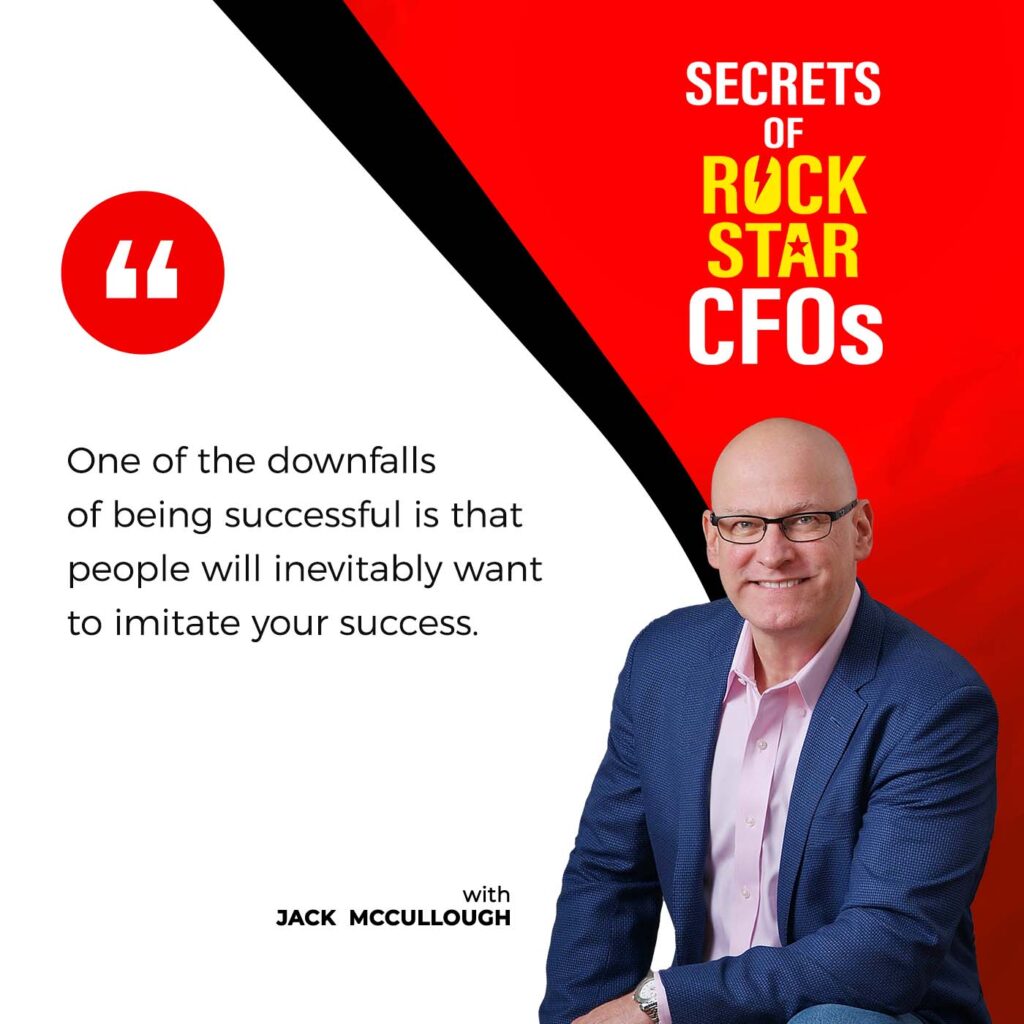
I’m a lifetime New Englander. It’s fairly pleasant today, although I look out the window and there’s snow on the roof, but it was six degrees a few days ago. That’s fun when you’re young, but at my age, and I’m about a decade older than you, Sean, it’s not that pleasant at all. I didn’t want to live there necessarily and I was young, but now that I’m older, it certainly holds its appeal. Was sports a part of you when you were growing up? Did you play any sports in high school?
I was never a great athlete growing up. I played tennis and soccer. I played on the junior varsity team and I played a bunch of Little League sports too, but I was never a great athlete. It was never something that my dad or my mom did, neither of them really were athletes. They weren’t even really into sports or sports fans. There just weren’t a lot of athletics in my household. Like I said, I give all the credit around how my kids turned out to my wife because she is a stud athlete.
One thing I’ve noticed about you, Sean, which is very admirable, you are on a couple of volunteer boards.
Yes.
Is that something part of your DNA that you were raised to give back? Can you talk a little bit about that experience?
Yeah, it was very much a part of my DNA growing up. We were encouraged from a young age. There were two things that my parents really instilled in us, myself, my brother, and my sister, which were really a strong work ethic. My parents used to always say, “The harder you work, the luckier you get.” They would hammer that home repeatedly. It’s not even a necessity, but the fact that giving back is not only the right thing to do but it has fulfillment and purpose to one’s life. We did do quite a bit of volunteer work as a kid growing up. It has been a passion for me. I’ve been on this board. It’s a fantastic organization called CoachArt. In fact, we’re about to have our annual board retreat on Friday. It was founded by a gentleman I mentioned earlier, Zander Lurie, who was the CEO of Momentive, the company that actually Tom Hale used to work at. It used to be called SurveyMonkey.
I still use the product.
It’s a great product. I think there’s one major competitor but it’s definitely a great product. Anyway, Zander founded this non-profit about 20 years ago called CoachArt. What we do is provide arts and athletics programming to chronically sick kids. The concept is if the kid is dealing with, God forbid, cancer, and they’re in a children’s hospital, they’re getting treatment. There are actually oftentimes great resources in the hospital beyond just the medical treatment, but when they come home, it may be hard for them to resume normal extracurricular activities. It may be hard for them to play sports or to go to art class, or sometimes they may not even be able to attend school. They may have to be homeschooled because of the condition that they have and this could oftentimes affect the siblings too because parents are so focused on taking care of the sick kid.
What CoachArt does is it partners with volunteer coaches to bring this programming typically into the home. It has a transformational effect on the lives of countless kids. It’s been a real privilege to be involved. It’s something that we got involved in with Headspace pretty early on maybe around 2015, 2016, or something like that. Then pretty soon thereafter, I was asked by Zander and a couple of other board members if I would consider joining the board. I’ve been on the board now for five or six years. It’s been a huge privilege, and I couldn’t be more proud of the work that the organization is doing.
Good for you. That’s very admirable. Sean, one of the downfalls of being successful is that inevitably people are going to want to get into the market that you ran and imitate your success. I know the company is very innovative, but how does it use an innovative culture to really keep on the cutting edge?
It’s a great question. They say that imitation is the sincerest form of flattery. I think that doesn’t surprise us. Indeed, there are starting to be competitors specifically in the smart ring spaces that are starting to pop up. Oura benefits from just having an extremely innovative culture, so we are constantly innovating. We’re not resting on our laurels. That means not only innovating around the hardware but innovating around the software and the science too. Said another way, even with a fixed number of sensors, there are still many more things that we can measure and deliver insights into ways for us to improve people’s health just even using software.
We have a huge commitment to science and research. We have a huge commitment to intellectual property. We have by far the most robust intellectual property portfolio of anyone in the smart ring space, perhaps even in the wearable space. We don’t rest on our laurels. We just keep pushing forward, keep innovating, keep shipping more and more insights, more and more value to our members to enable them to improve their overall health and wellness.
I like to ask my guests this, Sean, because I want to make sure that the stereotype of finance people isn’t dull and uninteresting, but is there a fun fact about you or maybe just something about you that would surprise people to learn?
I think it might be a useless fact. I have freakishly fast reflexes, which I put to no good use. If I drop something, I will oftentimes catch it before it hits the ground. The other day, an AirPod fell out of my ear and I just reached down without even looking and I grabbed it before it hit the ground. This seems to happen to me, I don’t know, a couple of times a week because maybe I’m a bit of a klutz. I’ll drop something and I’ll catch it before it hits the ground. That’s a pretty useless talent. I guess I should have maybe applied it towards being like a Formula One driver or something like that. It’s a skill that sometimes stuns my kids or my wife and they’re like, “That’s weird how you can do that.” Not particularly useful, but that’s a fun fact.
That’s funny, I’m envisioning the first Spider-Man movie going back, the one with Toby Maguire. Mary Jane, I think, dropped something and he catches it like that. He was surprised. He didn’t quite understand his powers yet. Maybe you’re bitten by a radioactive spider at some point too.
Maybe. If only I were as cool as Spider-Man, but sadly not.
Not too many like that. Anyway, this has been a lot of fun. Is there any advice you could share with the next generation of CFOs?
In meditation, we have this concept of the beginner’s mind. I was forced to have a beginner’s mind as I transitioned from a career in investment banking to being an operator. I would say just always bring that beginner’s mind, which I think practically translates into being intellectually curious. Read, listen to podcasts, learn, ask for advice, seek mentors. Anything that you can do to improve your craft, and to learn, I think you should do. I think the second tenet there is to remain humble and have the humility to know what you don’t know. Have the determination to go figure it out. That sounds really simple but that has really been the playbook that I’ve run in the last decade of being an operator.
I think that’s fantastic advice. Sean, this has been a lot of fun. I want to give you a chance to have the final word.
I really appreciate being invited to this show, Jack. I’m a big fan of your work. I’m very passionate about startups, about being an operator, about being a CFO. I have been the beneficiary of a lot of help, advice, guidance, shoulders to cry on, etc., in the last decade. Any opportunity to pay it forward is one that I really relish. I really appreciate you giving me that opportunity today.

